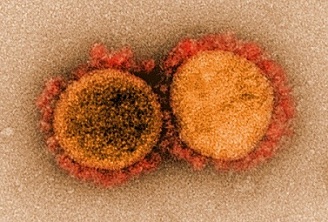U.S. Military Study Indicates Evidence Of SARS-CoV-2 Recombination!
Source: Recombination In SARS-CoV-2 Mar 10, 2021 4 years, 11 months, 2 weeks, 2 days, 23 hours, 42 minutes ago
American military researchers from the Viral Diseases Branch-Walter Reed Army Institute of Research-Maryland, the Uniformed Services University of the Health Sciences-Bethesda, Henry M. Jackson Foundation for the Advancement of Military Medicine and the Emerging Infectious Diseases Branch, Walter Reed Army Institute of Research-Maryland have in a new study found evidence of
SARS-CoV-2 recombination events including a couple involving the spike gene.

According to the study abstract, “The SARS-CoV-2 pandemic prompts evaluation of recombination in human coronavirus (hCoV) evolution. The study team undertook recombination analyses of 158,118 public seasonal hCoV, SARS-CoV-1, SARSCoV-2 and MERS-CoV genome sequences using the RDP4 software.
The team found moderate evidence for 8 SARS-CoV-2 recombination events, two of which involved the spike gene, and low evidence for one SARS-CoV-1 recombination event. Within MERS-CoV, 229E, OC43, NL63 and HKU1 datasets, the team noted 7, 1, 9, 14, and 1 high-confidence recombination events, respectively. There was propensity for recombination breakpoints in structural genes, and recombination severely skewed the temporal structure of these data, especially for NL63 and OC43. Bayesian time-scaled analyses on recombinant free data indicated the sampled diversity of seasonal CoVs emerged in the last 70 years, with 229E displaying continuous lineage replacements. These study findings emphasize the importance of genomic based surveillance to detect recombination in SARS-CoV-2, particularly if recombination may lead to immune evasion.”
The study findings were published on a preprint server and are currently being peer reviewed.
https://www.biorxiv.org/content/10.1101/2021.03.07.434287v1
The sudden emergence of the SARS-CoV-2 coronavirus which has to date infected almost 118 million people globally and caused more than 2.6 million deaths has spawned interest in the role of recombination in the evolution of this new virus as well as other human coronaviruses (hCoV).
Recombination is the natural or artificial rearrangement of genetic material in living organisms or viruses. Reseachers have previously observed recombination in many RNA viruses. Recombination is found to occur at a higher frequency in positive-sense RNA viruses, including SARS-CoV-2 and other medically significant coronaviruses.
https://www.nature.com/articles/nrmicro2614
https://cmr.asm.org/content/33/4/e00028-20
https://cmr.asm.org/content/20/4/660
Typically recombination in RNA viruses has been linked to changes in host range, virulence, and host response.
Identifying the presence of recombination and predicting the risk of recombination during the SARS-CoV-2 pandemic is critical for various reasons. This is because circulating recombinants of the virus may complicate molecular diagnostics and help the virus escape naturally acquired immunity. This has been observed in the norovirus genus that
has caused pandemics owing to the rapid emergence of new genotypes emerging from the recombination of structural genes.
Importantly such recombination events may have serious implications for SARS-CoV-2, especially if the recombinants can escape both natural and vaccine-induced immunity.
It must also be noted that genomic epidemiology is a powerful public health tool for SARS-CoV-2, and neglecting the recombinant data may result in incorrect epidemiological inference due to possible phylogenetic incongruence.
The American team of military researchers performed a comprehensive recombination analysis across all medically relevant human coronaviruses, including 158,118 public seasonal hCoV, SARS-CoV-1, SARS-CoV-2, and MERS-CoV genome sequences with the help of the RDP4 software.
The study team aimed at identifying the current and future risks of the emergence of recombinants of SARS-CoV-2.
The team found moderate evidence for SARS-CoV-2 recombination in the first year of the pandemic. Concerning other hCoV species, the team observed that recombination has a preference for structural genes and is relatively frequent in most relevant hCoVs over a comparatively short evolution timescale.
These study findings are timely going by the recent announcement of a recombinant SARS-CoV-2 strain and the increasing focus on the functional implications of antigenic evolution in seasonal coronaviruses.
https://www.thailandmedical.news/news/as-predicted,-first-sars-cov-2-reassortant-strain-emerges-involving-the-recombination-of-two-variants-resulting-in-a-heavily-mutated-coronavirus
Correponding author Dr Irina Maljkovic Berry from the Viral Diseases Branch, Walter Reed Army Institute of Research told Thailand Medical News, “In other hCoV species, we note that recombination has a predilection for structural genes and is relatively frequent in most medically significant hCoV over a relatively short evolution timescale.”
The study findings indicate relatively low viral diversity in the first year of the pandemic.
The study team noted 8 instances of recombination in over 100,000 SARS-CoV-2 genomes, and 2 of them involve the spike gene.
Interestingly however, the RDP4 software flagged all these instances of recombination as possibly driven by other processes though they were supported by 3 or more recombination detection methods. This may indicate the relatively lower viral diversity in the first year of the COVID-19 pandemic.
Furthermore there was no high-confidence recombination signal in SARS-CoV-1, which is a virus with limited temporal distribution.
Dr Maljkovic Berry added, “Our endemic coronavirus analyses also highlighted that recombination affected the estimated temporal structure of coronavirus sequence datasets. The study findings also highlight the significance of genomic surveillance in detecting SARS-CoV-2 recombination.”
Interestingly recombination was comparatively frequent in MERS-CoV and seasonal coronavirus datasets, including recombinants that are fit enough for onward transmission.
Also the analyses showed that 3 of the coronaviruses - MERS, OC43, and NL63 - had breakpoint predilection for structural genes. Among the MERS-CoV, 229E, OC43, NL63 and HKU1 datasets, they noted 7, 1, 9, 14, and 1 high-confidence recombination events, respectively.
She added, “We show that recombination was relatively frequent in seasonal coronavirus and MERS-CoV datasets comprising a longer period of sampling, including recombinants sufficiently fit for onward transmission.”
It should also be noted that Bayesian time-scaled analyses on recombinant-free data showed the diversity of seasonal CoVs emerged in the last 70 years, with HCoV-229E displaying continuous lineage replacements. According to the authors, these findings highlight the importance of genomic-based surveillance in the detection of SARS-CoV-2 recombination, especially if recombination may result in immune evasion.
Dr Maljkovic Berry added, “Ongoing genomic-based COVID-19 surveillance has recently been highlighted as a critical public health tool to detect novel SARSCoV-2 variants, such as the B.1.1.7, B.1.351, and P.1 variants.”
For more on
Recombination In SARS-CoV-2, keep on logging to Thailand Medical News.
